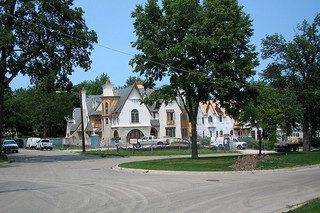One of the common arguments from those who are skeptical of shared-equity homeownership is that it's unfair to ask low-income people to give up their right to 100 percent of the appreciation of their home in exchange for the below-market price that got them into homeownership—specifically, that higher income homeowners would never accept such a deal.
Well, it turns out that's not quite true. Thanks to new higher downpayment requirements for jumbo loans, HousingWire reports that people buying homes in the half a million to a million dollar range are turning to companies that will front them half of the downpayment, in exchange for the rights to a substantial percentage of the appreciation when the home sells.
Now clearly, there are a few significant differences here from shared-equity homeownership. These homebuyers could afford a home, and indeed generally even the full downpayment, if they chose to do something like, as the article's example says, sell stocks or pull cash out of their business. There's no affordability being created or preserved anywhere along the way, just profit for a clever financial company. Certainly there's no community orientation, mission, or control.
But I think this trend should probably put to rest the patronizing idea that offering a contract that trades windfall upsides for homebuying assistance is an affront to low-income buyers.
(McMansion photo by Flickr user pluckytree, CC BY-ND.)





More than once when I’ve pitched the community land trust approach to homeownership – the folks I’m talking with, government workers, members of funding boards, etc. – say something like, “Wow, that sounds like a good idea for the middle class too.” It seems logical that communities where shared-equity ownership becomes widespread are actually creating a more stable, less volatile real estate market – one where wide swings in the perception of value should be mitigated to some degree. Making land less of a commodity and more of a shared asset, makes sense for persons of all incomes it seems to me.
For a few years I lived in Arden, Delaware, one of the few remaining Henry George-inspired land trust communities. In the late 1800s and early 1900s a number of land trust communities spring up in the U.S. While not based on affordability – Arden to this day is a coveted place to live. The land trust basis of the village and its emphasis on “community” gives it some unique qualities that go far beyond the market value of the real estate. And if you look at the housing in Arden closely, you’ll find that much of it is actually smaller and older than the surrounding neighborhoods – but the selling prices are nearly identical.
So why not have shared-equity homeownership available to persons of all income levels? When folks at various places on the wealth spectrum find value in the same things – we know we’re on to something good and lasting.
In studying this problem people may want to look at the successful co-op experiment of Penn Station South in New York City. Penn Station South has been a middle income shared equity development for decades. Several years ago a referendum to end this by taking Penn Station South out of New York State’s Mitchell Lama program was decidedly defeated by the residents despite the fact that many would benefit enormously from going to value by retiring the state mortgage. Among the innovations undertaken by the co-op at Penn Station South was the self generation of electricity which has resulted in lower enrgy bills and also kept the lights on during recent power failures.
Penn Station South is a special case as there was a collective effort to build it in the first place, but the steadfastness to which residents cling to the experiment should be noted as well as studied.